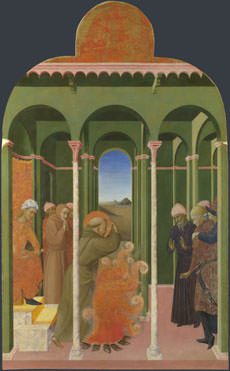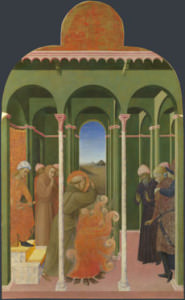Mission Monday: Insights on Interreligious Dialogue (Part 2)

Friday we shared the first half of Br. John Kiesler, OFM’s recent workshop from the United States Catholic Mission Association conference in Los Angeles on interreligious dialogue.
Today we finish his talk on how St. Francis of Assisi’s encounter with the sultan can provide us with insight today.
How can Francis’ encounter with the sultan act as a ‘model for’ interreligious dialogue? I believe that this event can highlight certain attitudes which can form the basis for any genuine dialogue.
We are all brothers and sisters
 |
| Sassetta’s “San Francescp davant al sultan,” |
Francis went to the sultan as a brother and out of concern for his salvation sought his conversion. He began not by seeing the sultan as enemy to be feared (as the crusaders did) but as a brother under God.
The need to respect the other
Francis spoke to the sultan about his faith and beliefs (at least in the earliest accounts) and didn’t disparage Islam, the Koran or Muhammad. It was typical for medieval missionaries to the Muslims to begin by attacking the Koran and condemn Muhammad as a fraud. Francis rejected this approach as one in love with God and for this reason saw no reason not to speak of God’s love for all.
The importance of a witness of life
The unapproved Rule of the Franciscan Order (i.e. the Regula Non Bullata of 1219) is the first discussion of mission ever to appear in a catholic religious order’s rule. In Chapter 16 the friars are told to live humbly among Muslims and non-believeers, to be subject to them and preach only when it would please the Lord. It was through this humble living of the Gospel life that others would be able to understand the Christian message, far more than through eloquent preaching. For many scholars it was Francis’ brief time among the Sultan which led to this approach to Islam. (5)
A willingness to learn from the other
The encounter with the Sultan apparently influenced Francis to rethink his own views on Islam. What once has perhaps seemed an exotic or even heretical religion was now filled with practices which Francis saw as admirable, so much that he advised their imitation. Scholars say that Francis’ request to reulers that they sound a bell daily for public common prayer and his Praises of God can be seen as reflecting the Muslim practice of daily public prayer and the famous Muslim prayer of the “99 Names of God.” (6)
Not our measure of success
Francis left the sultan convinced that his mission to the sultan was a failure. The war continued, the sultan failed to convert and returning to Italy, he found the fledging Franciscan Order in disarray during his absence. But was it a failure? Perhaps the measure of success it not our normal desire for immediate results? Possibly the result of this encounter with the sultan and reflection on the Crusades, Francis came to see that the pilgrimage sites in the Holy Land, while important, were not central to the Christian life. The birth of Christ could be celebrated in Greccio and the passion of Christ could be remembered at Mount La Verna. There is no need for war to retake the Holy Land but a need to change our perspective on their importance. Success was not necessarily changing the other but changing self. (7)
A willingness for ongoing conversion
Francis was born and lived in a time in which the ideals of chivalry were very common. We know that as a youth Francis was enchanted by notions of knighthood; that he fought in one battle against Perugia, the rival of Assisi, and was even held as a prison of war for a year. During this time there was much romanticism and glory attached to the rule of knightly chivalry as well as the Crusade which was seen as a fulfilling a sacred duty to regain Christian control of the Holy Land. Francis’ encounter with the sultan might have led him to see that chivalry and crusading were not integral to being a Christian.
The sultan
We know little about this encounter affected the sultan. Historians tell us that he was known as an open-minded ruler, tolerant of Christian subjects, and a man who wanted peace; he even offered a treaty to the Crusaders which was rejected. Nowhere in Muslim historical archives do we find mention of this meeting between the Sultan al-Kamil and Francis of Assisi. It was probably seen as uneventful, though there is an obscure reference on the grace of a Sufi religious leader, who was the advisor to the sultan. (9)
Conclusion
While we see past evidence of violence and wholesale rejection of other religious there are those who offered a different approach. Through his actions Francis rejected the prevailing attitude of the day that violence was needed first before any conversion of the Muslims were possible. A rejetection of violence coupled with a belief that the sultan was a brother who deserved respect and love. Through later letter and actions we saw that Francis came to learn much from this encounter. What have been our experiences with interreligious dialogue and how might these insights shape future responses?
A former missionary among the Akimel O’Otham in Arizona, Br. John has committed himself to the “mission charism” that Francis considered so important. He believes that God is manifest in all religions and cultures and that the missionary’s task is one of “mutual” mission; discovering the Christ who was present before the missionary arrived. Br. John teaches missiology at the Franciscan School of Theology, which is a member school of the Graduate Theological Union in Berkley, Calif.
Tagged in:


